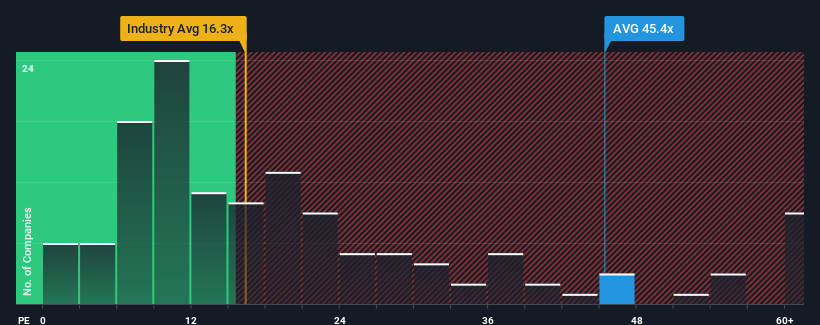- India
- /
- Transportation
- /
- NSEI:AVG
Why Investors Shouldn't Be Surprised By AVG Logistics Limited's (NSE:AVG) 30% Share Price Surge

AVG Logistics Limited (NSE:AVG) shares have continued their recent momentum with a 30% gain in the last month alone. The annual gain comes to 279% following the latest surge, making investors sit up and take notice.
Following the firm bounce in price, AVG Logistics' price-to-earnings (or "P/E") ratio of 45.4x might make it look like a sell right now compared to the market in India, where around half of the companies have P/E ratios below 30x and even P/E's below 17x are quite common. However, the P/E might be high for a reason and it requires further investigation to determine if it's justified.
Earnings have risen at a steady rate over the last year for AVG Logistics, which is generally not a bad outcome. It might be that many expect the reasonable earnings performance to beat most other companies over the coming period, which has increased investors’ willingness to pay up for the stock. You'd really hope so, otherwise you're paying a pretty hefty price for no particular reason.
View our latest analysis for AVG Logistics

Does Growth Match The High P/E?
AVG Logistics' P/E ratio would be typical for a company that's expected to deliver solid growth, and importantly, perform better than the market.
Taking a look back first, we see that the company managed to grow earnings per share by a handy 3.3% last year. Pleasingly, EPS has also lifted 608% in aggregate from three years ago, partly thanks to the last 12 months of growth. Therefore, it's fair to say the earnings growth recently has been superb for the company.
This is in contrast to the rest of the market, which is expected to grow by 25% over the next year, materially lower than the company's recent medium-term annualised growth rates.
With this information, we can see why AVG Logistics is trading at such a high P/E compared to the market. Presumably shareholders aren't keen to offload something they believe will continue to outmanoeuvre the bourse.
The Bottom Line On AVG Logistics' P/E
AVG Logistics shares have received a push in the right direction, but its P/E is elevated too. Using the price-to-earnings ratio alone to determine if you should sell your stock isn't sensible, however it can be a practical guide to the company's future prospects.
As we suspected, our examination of AVG Logistics revealed its three-year earnings trends are contributing to its high P/E, given they look better than current market expectations. At this stage investors feel the potential for a deterioration in earnings isn't great enough to justify a lower P/E ratio. If recent medium-term earnings trends continue, it's hard to see the share price falling strongly in the near future under these circumstances.
You should always think about risks. Case in point, we've spotted 3 warning signs for AVG Logistics you should be aware of, and 1 of them is a bit concerning.
You might be able to find a better investment than AVG Logistics. If you want a selection of possible candidates, check out this free list of interesting companies that trade on a low P/E (but have proven they can grow earnings).
New: Manage All Your Stock Portfolios in One Place
We've created the ultimate portfolio companion for stock investors, and it's free.
• Connect an unlimited number of Portfolios and see your total in one currency
• Be alerted to new Warning Signs or Risks via email or mobile
• Track the Fair Value of your stocks
Have feedback on this article? Concerned about the content? Get in touch with us directly. Alternatively, email editorial-team (at) simplywallst.com.
This article by Simply Wall St is general in nature. We provide commentary based on historical data and analyst forecasts only using an unbiased methodology and our articles are not intended to be financial advice. It does not constitute a recommendation to buy or sell any stock, and does not take account of your objectives, or your financial situation. We aim to bring you long-term focused analysis driven by fundamental data. Note that our analysis may not factor in the latest price-sensitive company announcements or qualitative material. Simply Wall St has no position in any stocks mentioned.
About NSEI:AVG
Proven track record slight.
Similar Companies
Market Insights
Community Narratives



